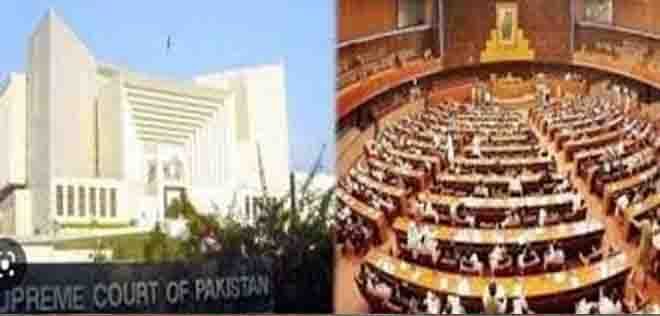Supreme Court (Practice and Procedure) Act 2023 stands in violation of Article 191 of the Constitution of Pakistan: President SCBA
SCBA President Abid Shahid Zuberi submitted a written reply before the top court on Tuesday responding to a case filed against the Act.
ISLAMABAD ( Web News )
Supreme Court Bar Association (SCBA) President Abid Shahid Zuberi has contended that the Supreme Court (Practice and Procedure) Act 2023 stands in violation of Article 191 of the Constitution of Pakistan as it attempts to intrude on the exclusive powers granted to the apex court. However, the SCBA has argued that Article 191 must be read along with other sections of the Constitution that deal with the functioning of the judiciary.
On the other hand the eight-member larger bench of the Supreme Court headed by Chief Justice Umar Ata Bandial and comprising Justice Ijazul Ahsan, Justice Munib Akhtar, Justice Sayyed Mazahar Ali Akbar Naqvi, Justice Muhammad Ali Mazhar, Mrs. Justice Ayesha A. Malik, Justice Syed Hasan Azhar Rizvi and Justice Shahid Waheed will hear the petitions filed against the Supreme Court (Practice and Procedure) Act 2023 on 1st June (Thursday) at 12:15 PM. Nine different petitions have been filed against the Supreme Court (Practice and Procedure) Act 2023.
SCBA President Abid Shahid Zuberi submitted a written reply before the top court on Tuesday responding to a case filed against the Act.
In his statement, Zuberi specified that Article 191 confers the apex court with exclusive power to make rules regulating its practice and procedure. “Subject to the Constitution and law, the Supreme Court may make rules regulating the practice and procedure of the Court,” reads Article 191.
Abid Zuberi pointed out that Sections 2, 4 and 6, of the Act assented into law by President Dr. Arif Alvi on May 26, 2023, after being passed by the National Assembly and the Senate, “deals with the constitution of benches and therefore falls within the purview of practice and procedure”.
According to the SCBA, while Article 191 is subject to the Constitution, there is no conflicting provision in the Constitution against the powers granted under this, therefore it is not “subject to or subservient to any [other] provision”.
“The Honourable Supreme Court has already enacted rules in relation to its practice and procedure, given that the said field is already occupied, Parliament cannot now enact a conflicting piece of legislation,” wrote the SCBA president.
He further specified that while the parliament can legislate on “enlargements of the jurisdiction of the Supreme Court and the conferring thereon of supplemental powers [as per the Constitution]” it can only do so through a Constitutional amendment. As it stands currently, the parliament cannot interfere in the jurisdiction of the top court, wrote Abid Zuberi, referring to Articles 184 – 186 of the Constitution.
The Supreme Court (Practice and Procedure) Act 2023, which sought to reduce the chief justice of Pakistan’s powers to take suo motu action and constitute benches, became law on April 21, despite the top court’s orders to stop its enforcement.
The National Assembly’s official Twitter account made the announcement. “Supreme Court (Practice and Procedure) Act, 2023 of the Majlis-e-Shoora (Parliament) is deemed to have been assented by the president w.e.f., 21 April 2023, under Clause (2) of Article 75 of the Constitution”.
It is pertinent to note that President Dr. Arif Alvi had returned the bill unsigned to parliament, twice.
The apex court itself “pre-emptively” stopped the enforcement of a bill that sought to clip the powers of the chief justice to initiate suo motu proceedings or form benches.
Through the Act, the federal government limited the CJP’s powers to take suo motu notice as well as powers to constitute benches on his own in the aftermath of the Supreme Court’s decision to order elections in Punjab and Khyber-Pakhtunkhwa within 90 days of their dissolution, among other such decisions.
The federal cabinet amended the suo motu powers of the CJP, saying that the top judge of the country can’t automatically initiate suo motu proceedings and proposed that three judges of the Supreme Court would decide if the court should initiate suo motu proceedings in a particular matter.
Section 2 (constitution of benches) of the law states that “every cause, appeal or matter before the Supreme Court shall be heard and disposed of by a bench constituted by the committee comprising the chief justice of Pakistan and two senior-most judges, in order of seniority.” It adds that the “decisions of the committee shall be by majority.”
Section 3 of the proposed law proposes that any matter invoking the exercise of original jurisdiction under clause (3) of Article 184 (original jurisdiction by the Supreme Court) of the Constitution shall be first placed before the committee constituted under section 2 for examination.
It adds that if the committee is of the view that a question of public importance with reference to the enforcement of any of the fundamental rights conferred by Chapter I of Part II of the Constitution is involved, it shall constitute a bench comprising not less than three judges of the Supreme Court which may also include the members of the committee, for adjudication of the matter.

